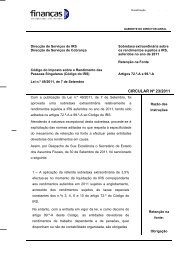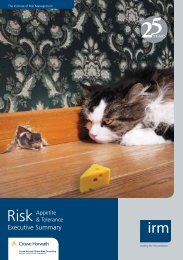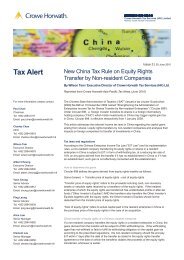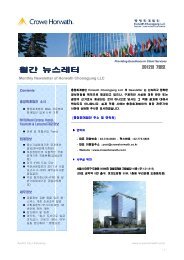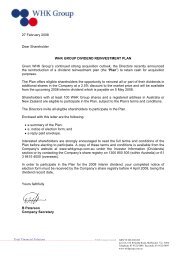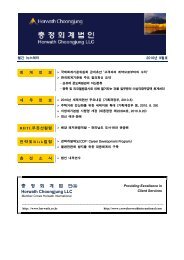Guidance Paper - The Institute of Risk Management
Guidance Paper - The Institute of Risk Management
Guidance Paper - The Institute of Risk Management
You also want an ePaper? Increase the reach of your titles
YUMPU automatically turns print PDFs into web optimized ePapers that Google loves.
<strong>The</strong> Chartered <strong>Institute</strong> <strong>of</strong> Internal<br />
Auditors welcomes this contribution<br />
from the <strong>Institute</strong> <strong>of</strong> <strong>Risk</strong> <strong>Management</strong><br />
to the debate on risk appetite and<br />
risk tolerance. In theory, the idea <strong>of</strong><br />
deciding how much risk <strong>of</strong> different<br />
types the organisation wishes to take<br />
and accept sounds easy. In practice, it is<br />
difficult and needs ongoing effort both<br />
from those responsible for governance<br />
in agreeing what is acceptable and<br />
from all levels <strong>of</strong> management in<br />
communicating how much risk they<br />
wish to take and in monitoring<br />
how much they are actually taking.<br />
Anything that stimulates debate on the<br />
practical challenges <strong>of</strong> risk management<br />
is to be welcomed.<br />
Jackie Cain<br />
Policy Director<br />
Chartered <strong>Institute</strong> <strong>of</strong> Internal Auditors<br />
All successful organisations need to<br />
be clear about their willingness to<br />
accept risk in pursuit <strong>of</strong> their goals.<br />
Armed with this clarity, boards and<br />
management can make meaningful<br />
decisions about what actions to take at<br />
all levels <strong>of</strong> the organisation and the<br />
extent to which they must deal with<br />
the associated risks. But defining and<br />
implementing risk appetite is work in<br />
progress for many. CIMA therefore<br />
warmly welcomes this new guidance<br />
from the <strong>Institute</strong> <strong>of</strong> <strong>Risk</strong> <strong>Management</strong><br />
as a sound foundation for developing<br />
best practice on this critical topic.<br />
Gillian Lees<br />
Head <strong>of</strong> Corporate Governance<br />
Chartered <strong>Institute</strong> <strong>of</strong><br />
<strong>Management</strong> Accountants (CIMA)<br />
This document is an important<br />
contribution to a key area <strong>of</strong> board<br />
activity and helpfully addresses one <strong>of</strong><br />
the issues highlighted in the Financial<br />
Reporting Council’s <strong>Guidance</strong> on<br />
Board Effectiveness. ICSA is pleased to<br />
support the work started here by IRM,<br />
and looks forward to a well-informed<br />
debate and some useful conclusions.<br />
Seamus Gillen<br />
Director <strong>of</strong> Policy<br />
<strong>Institute</strong> <strong>of</strong> Chartered Secretaries and<br />
Administrators (ICSA)<br />
This paper will be helpful to senior<br />
managers in public service organisations<br />
who are trying to understand risk<br />
appetite in the context <strong>of</strong> their own<br />
strategic and operational decision<br />
making. In its recently published Core<br />
Competencies in Public Service <strong>Risk</strong><br />
<strong>Management</strong>, Alarm identified the<br />
need to understand the organisation’s<br />
risk appetite and risk tolerance, as<br />
part <strong>of</strong> the key function <strong>of</strong> identifying,<br />
analysing, evaluating and responding to<br />
risk. <strong>The</strong> ‘questions for the boardroom’,<br />
set out in this paper, could easily be<br />
translated into ‘questions for the<br />
public organisation’s senior executive<br />
committee’ and as such may be <strong>of</strong> value<br />
to many Alarm members and their<br />
organisations.<br />
Dr Lynn T Drennan<br />
Chief Executive<br />
Alarm, the public risk management<br />
association<br />
CIPFA is pleased to endorse this work<br />
by IRM on risk appetite and tolerance<br />
which provides welcome leadership<br />
on a challenging subject for both the<br />
public and private sectors. We look<br />
forward to taking the debate further<br />
with our membership in pursuit <strong>of</strong><br />
our commitment to sound financial<br />
management and good governance.<br />
Diana Melville<br />
Governance Adviser<br />
Chartered <strong>Institute</strong> <strong>of</strong> Public Finance<br />
and Accountancy<br />
This paper sends out a clear statement<br />
that the principle <strong>of</strong> risk appetite<br />
emanating from the board is the<br />
only effective way to initiate an<br />
ERM implementation. Charterhouse<br />
<strong>Risk</strong> <strong>Management</strong> is delighted to be<br />
associated with the launch <strong>of</strong> this paper<br />
after contributing to the consultation<br />
process. Our own experience with<br />
clients confirms that this approach is<br />
not only critical, but that the whole<br />
process must be undertaken with<br />
a practical rather than theoretical<br />
vigour. This is an essential ingredient<br />
<strong>of</strong> our delivery capability. References to<br />
‘appetite’ and ‘hunger’ only reinforce<br />
the living nature <strong>of</strong> the required<br />
approach.<br />
Neil Mockett<br />
CTO<br />
Charterhouse <strong>Risk</strong> <strong>Management</strong><br />
3






